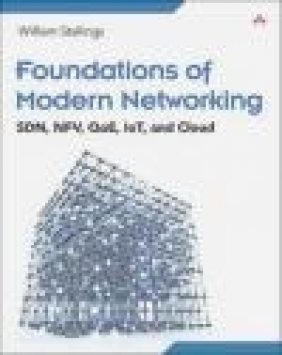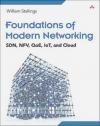Foundations of Modern Networking
William Stallings
Foundations of Modern Networking
William Stallings
- Producent: Addison Wesley Publishing Company
- Rok produkcji: 2015
- ISBN: 9780134175393
- Ilość stron: 544
- Oprawa: Miękka
Niedostępna
Opis: Foundations of Modern Networking - William Stallings
Foundations of Modern Networking is a comprehensive, unified survey of modern networking technology and applications for today's professionals, managers, and students. Dr. William Stallings offers clear and well-organized coverage of five key technologies that are transforming networks: Software-Defined Networks (SDN), Network Functions Virtualization (NFV), Quality of Experience (QoE), the Internet of Things (IoT), and cloudbased services. Dr. Stallings reviews current network ecosystems and the challenges they face-from Big Data and mobility to security and complexity. Next, he offers complete, self-contained coverage of each new set of technologies: how they work, how they are architected, and how they can be applied to solve real problems. Dr. Stallings presents a chapter-length analysis of emerging security issues in modern networks. He concludes with an up-to date discussion of networking careers, including important recent changes in roles and skill requirements. Coverage: * Elements of the modern networking ecosystem: technologies, architecture, services, and applications * Evolving requirements of current network environments * SDN: concepts, rationale, applications, and standards across data, control, and application planes * OpenFlow, OpenDaylight, and other key SDN technologies * Network functions virtualization: concepts, technology, applications, and software defined infrastructure * Ensuring customer Quality of Experience (QoE) with interactive video and multimedia network traffic * Cloud networking: services, deployment models, architecture, and linkages to SDN and NFV * IoT and fog computing in depth: key components of IoT-enabled devices, model architectures, and example implementations * Securing SDN, NFV, cloud, and IoT environments * Career preparation and ongoing education for tomorrow's networking careers Key Features: * Strong coverage of unifying principles and practical techniques * More than a hundred figures that clarify key concepts * Web support at williamstallings.com/Network/ * QR codes throughout, linking to the website and other resources * Keyword/acronym lists, recommended readings, and glossary * Margin note definitions of key words throughout the textPreface xxi PART I MODERN NETWORKING 3 Chapter 1: Elements of Modern Networking 4 1.1 The Networking Ecosystem ... 5 1.2 Example Network Architectures ... 7 A Global Network Architecture ... 7 A Typical Network Hierarchy ... 9 1.3 Ethernet ... 11 Applications of Ethernet ... 11 Standards ... 14 Ethernet Data Rates ... 14 1.4 Wi-Fi ... 19 Applications of Wi-Fi ... 19 Standards ... 21 Wi-Fi Data Rates ... 21 1.5 4G/5G Cellular ... 23 First Generation ... 23 Second Generation ... 23 Third Generation ... 24 Fourth Generation ... 24 Fifth Generation ... 25 1.6 Cloud Computing ... 25 Cloud Computing Concepts ... 26 The Benefits of Cloud Computing ... 27 Cloud Networking ... 28 Cloud Storage ... 28 1.7 Internet of Things... 28 Things on the Internet of Things ... 28 Evolution ... 29 Layers of the Internet of Things ... 29 1.8 Network Convergence ... 30 1.9 Unified Communications ... 33 1.10 Key Terms ... 37 1.11 References ... 37 Chapter 2: Requirements and Technology 38 2.1 Types of Network and Internet Traffic ... 39 Elastic Traffic ... 39 Inelastic Traffic ... 40 Real-Time Traffic Characteristics ... 43 2.2 Demand: Big Data, Cloud Computing, and Mobile Traffic ... 45 Big Data ... 45 Cloud Computing ... 48 Mobile Traffic ... 51 2.3 Requirements: QoS and QoE ... 53 Quality of Service ... 53 Quality of Experience ... 54 2.4 Routing ... 55 Characteristics ... 55 Packet Forwarding ... 56 Routing Protocols ... 57 Elements of a Router ... 59 2.5 Congestion Control ... 60 Effects of Congestion ... 60 Congestion Control Techniques ... 64 2.6 SDN and NFV ... 67 Software-Defined Networking ... 67 Network Functions Virtualization ... 69 2.7 Modern Networking Elements ... 71 2.8 Key Terms ... 72 2.9 References ... 73 PART II SOFTWARE DEFINED NETWORKS 75 Chapter 3: SDN: Background and Motivation 76 3.1 Evolving Network Requirements ... 77 Demand Is Increasing ... 77 Supply Is Increasing ... 77 Traffic Patterns Are More Complex ... 78 Traditional Network Architectures are Inadequate ... 79 3.2 The SDN Approach ... 80 Requirements... 80 SDN Architecture ... 81 Characteristics of Software-Defined Networking ... 85 3.3 SDN- and NFV-Related Standards ... 85 Standards-Developing Organizations ... 87 Industry Consortia ... 89 Open Development Initiatives ... 89 3.4 Key Terms ... 91 3.5 References ... 91 Chapter 4: SDN Data Plane and OpenFlow 92 4.1 SDN Data Plane ... 93 Data Plane Functions ... 93 Data Plane Protocols ... 95 4.2 OpenFlow Logical Network Device ... 95 Flow Table Structure ... 98 Flow Table Pipeline ... 102 The Use of Multiple Tables ... 106 Group Table ... 107 4.3 OpenFlow Protocol ... 109 4.4 Key Terms ... 111 Chapter 5: SDN Control Plane 112 5.1 SDN Control Plane Architecture ... 113 Control Plane Functions ... 113 Southbound Interface ... 116 Northbound Interface ... 117 Routing ... 119 5.2 ITU-T Model ... 120 5.3 OpenDaylight ... 122 OpenDaylight Architecture ... 122 OpenDaylight Helium ... 124 5.4 REST ... 128 REST Constraints ... 128 Example REST API ... 130 5.5 Cooperation and Coordination Among Controllers ... 133 Centralized Versus Distributed Controllers ... 133 High-Availability Clusters ... 134 Federated SDN Networks ... 135 Border Gateway Protocol ... 136 Routing and QoS Between Domains ... 137 Using BGP for QoS Management ... 138 IETF SDNi ... 140 OpenDaylight SNDi ... 141 5.6 Key Terms ... 143 5.7 References ... 143 Chapter 6: SDN Application Plane 144 6.1 SDN Application Plane Architecture ... 145 Northbound Interface ... 146 Network Services Abstraction Layer ... 146 Network Applications ... 147 User Interface ... 147 6.2 Network Services Abstraction Layer ... 147 Abstractions in SDN ... 147 Frenetic ... 150 6.3 Traffic Engineering ... 153 PolicyCop ... 153 6.4 Measurement and Monitoring ... 157 6.5 Security ... 157 OpenDaylight DDoS Application ... 157 6.6 Data Center Networking ... 162 Big Data over SDN ... 163 Cloud Networking over SDN ... 164 6.7 Mobility and Wireless ... 168 6.8 Information-Centric Networking ... 168 CCNx ... 169 Use of an Abstraction Layer ... 170 6.9 Key Terms ... 173 PART III VIRTUALIATION 175 Chapter 7: Network Functions Virtualization: Concepts and Architecture 176 7.1 Background and Motivation for NFV ... 177 7.2 Virtual Machines ... 178 The Virtual Machine Monitor... 179 Architectural Approaches ... 180 Container Virtualization ... 183 7.3 NFV Concepts ... 184 Simple Example of the Use of NFV ... 188 NFV Principles ... 189 High-Level NFV Framework ... 190 7.4 NFV Benefits and Requirements ... 191 NFV Benefits ... 191 NFV Requirements ... 192 7.5 NFV Reference Architecture ... 193 NFV Management and Orchestration ... 194 Reference Points ... 195 Implementation ... 196 7.6 Key Terms ... 197 7.7 References ... 197 Chapter 8: NFV Functionality 198 8.1 NFV Infrastructure ... 199 Container Interface ... 199 Deployment of NFVI Containers ... 203 Logical Structure of NFVI Domains ... 204 Compute Domain ... 205 Hypervisor Domain ... 208 Infrastructure Network Domain ... 209 8.2 Virtualized Network Functions ... 213 VNF Interfaces ... 213 VNFC to VNFC Communication ... 215 VNF Scaling ... 216 8.3 NFV Management and Orchestration ... 217 Virtualized Infrastructure Manager ... 217 Virtual Network Function Manager ... 218 NFV Orchestrator ... 219 Repositories ... 219 Element Management ... 220 OSS/BSS ... 220 8.4 NFV Use Cases ... 221 Architectural Use Cases ... 222 Service-Oriented Use Cases ... 223 8.5 SDN and NFV ... 225 8.6 Key Terms ... 228 8.7 References ... 229 Chapter 9: Network Virtualization 230 9.1 Virtual LANs ... 231 The Use of Virtual LANs ... 234 Defining VLANs ... 235 Communicating VLAN Membership ... 236 IEEE 802.1Q VLAN Standard ... 237 Nested VLANs ... 239 9.2 OpenFlow VLAN Support ... 240 9.3 Virtual Private Networks ... 241 IPsec VPNs ... 241 MPLS VPNs ... 243 9.4 Network Virtualization ... 247 A Simplified Example ... 248 Network Virtualization Architecture ... 250 Benefits of Network Virtualization ... 252 9.5 OpenDaylight's Virtual Tenant Network... 253 9.6 Software-Defined Infrastructure ... 257 Software-Defined Storage ... 259 SDI Architecture ... 261 9.7 Key Terms ... 263 9.8 References ... 263 PART IV DEFINING AND SUPPORTING USER NEEDS 265 Chapter 10: Quality of Service 266 10.1 Background ... 267 10.2 QoS Architectural Framework ... 268 Data Plane ... 269 Control Plane ... 271 Management Plane ... 272 10.3 Integrated Services Architecture ... 273 ISA Approach ... 273 ISA Components ... 274 ISA Services ... 276 Queuing Discipline ... 277 10.4 Differentiated Services ... 279 Services ... 281 DiffServ Field ... 282 DiffServ Configuration and Operation ... 284 Per-Hop Behavior ... 286 Default Forwarding PHB ... 287 10.5 Service Level Agreements ... 291 10.6 IP Performance Metrics ... 293 10.7 OpenFlow QoS Support ... 296 Queue Structures ... 296 Meters ... 297 10.8 Key Terms ... 299 10.9 References ... 299 Chapter 11: QoE: User Quality of Experience 300 11.1 Why QoE? ... 301 Online Video Content Delivery ... 302 11.2 Service Failures Due to Inadequate QoE Considerations ... 304 11.3 QoE-Related Standardization Projects ... 304 11.4 Definition of Quality of Experience ... 305 Definition of Quality ... 306 Definition of Experience ... 306 Quality Formation Process ... 307 Definition of Quality of Experience ... 308 11.5 QoE Strategies in Practice ... 308 The QoE/QoS Layered Model ... 308 Summarizing and Merging the QoE/QoS Layers ... 310 11.6 Factors Influencing QoE ... 311 11.7 Measurements of QoE ... 312 Subjective Assessment ... 312 Objective Assessment ... 314 End-User Device Analytics ... 315 Summarizing the QoE Measurement Methods ... 316 11.8 Applications of QoE ... 317 11.9 Key Terms ... 319 11.10 References ... 320 Chapter 12: Network Design Implications of QoS and QoE 322 12.1 Classification of QoE/QoS Mapping Models ... 323 Black-Box Media-Based QoS/QoE Mapping Models ... 323 Glass-Box Parameter-Based QoS/QoE Mapping Models ... 325 Gray-Box QoS/QoE Mapping Models ... 326 Tips for QoS/QoE Mapping Model Selection ... 327 12.2 IP-Oriented Parameter-Based QoS/QoE Mapping Models ... 327 Network Layer QoE/QoS Mapping Models for Video Services ... 328 Application Layer QoE/QoS Mapping Models for Video Services . . 328 12.3 Actionable QoE over IP-Based Networks ... 330 The System-Oriented Actionable QoE Solution ... 330 The Service-Oriented Actionable QoE Solution ... 331 12.4 QoE Versus QoS Service Monitoring ... 332 QoS Monitoring Solutions... 334 QoE Monitoring Solutions ... 335 12.5 QoE-Based Network and Service Management ... 341 QoE-Based Management of VoIP Calls ... 341 QoE-Based Host-Centric Vertical Handover ... 341 QoE-Based Network-Centric Vertical Handover ... 342 12.6 Key Terms ... 344 12.7 References ... 344 PART V MODERN NETWORK ARCHITECTURE: CLOUDS AND FOG 347 Chapter 13: Cloud Computing 348 13.1 Basic Concepts ... 349 13.2 Cloud Services ... 351 Software as a Service ... 352 Platform as a Service ... 353 Infrastructure as a Service ... 354 Other Cloud Services ... 355 XaaS ... 357 13.3 Cloud Deployment Models ... 358 Public Cloud ... 359 Private Cloud ... 359 Community Cloud ... 360 Hybrid Cloud ... 360 13.4 Cloud Architecture ... 361 NIST Cloud Computing Reference Architecture ... 361 ITU-T Cloud Computing Reference Architecture ... 365 13.5 SDN and NFV ... 368 Service Provider Perspective ... 369 Private Cloud Perspective ... 369 ITU-T Cloud Computing Functional Reference Architecture ... 369 13.6 Key Terms ... 371 Chapter 14: The Internet of Things: Components 372 14.1 The IoT Era Begins ... 373 14.2 The Scope of the Internet of Things ... 374 14.3 Components of IoT-Enabled Things ... 377 Sensors ... 377 Actuators ... 380 Microcontrollers ... 381 Transceivers ... 386 RFID ... 387 14.4 Key Terms ... 393 14.5 References ... 393 Chapter 15: The Internet of Things: Architecture and Implementation 394 15.1 IoT Architecture ... 395 ITU-T IoT Reference Model ... 395 IoT World Forum Reference Model ... 401 15.2 IoT Implementation ... 409 IoTivity ... 409 Cisco IoT System ... 420 ioBridge ... 427 15.3 Key Terms ... 431 15.4 References ... 431 PART VI RELATED TOPICS 433 Chapter 16: Security 434 16.1 Security Requirements ... 435 16.2 SDN Security ... 436 Threats to SDN ... 436 Software-Defined Security ... 440 16.3 NFV Security ... 441 Attack Surfaces ... 441 ETSI Security Perspective ... 444 Security Techniques ... 446 16.4 Cloud Security ... 446 Security Issues and Concerns ... 449 Cloud Security Risks and Countermeasures ... 450 Data Protection in the Cloud ... 452 Cloud Security as a Service ... 453 Addressing Cloud Computer Security Concerns ... 456 16.5 IoT Security ... 458 The Patching Vulnerability ... 459 IoT Security and Privacy Requirements Defined by ITU-T ... 459 An IoT Security Framework ... 462 Conclusion ... 465 16.6 Key Terms ... 465 16.7 References ... 465 Chapter 17: The Impact of the New Networking on IT Careers 466 17.1 The Changing Role of Network Professionals ... 467 Changing Responsibilities ... 467 Impact on Job Positions ... 469 Bottom Line ... 470 17.2 DevOps ... 470 DevOps Fundamentals ... 471 The Demand for DevOps ... 475 DevOps for Networking ... 476 DevOps Network Offerings ... 478 Cisco DevNet ... 479 Conclusion on the Current State of DevOps ... 479 17.3 Training and Certification ... 480 Certification Programs ... 480 IT Skills ... 488 17.4 Online Resources ... 489 17.5 References ... 491 Appendix A: References 492 Glossary 498 9780134175393, TOC, 10/5/2015
Szczegóły: Foundations of Modern Networking - William Stallings
Tytuł: Foundations of Modern Networking
Autor: William Stallings
Producent: Addison Wesley Publishing Company
ISBN: 9780134175393
Rok produkcji: 2015
Ilość stron: 544
Oprawa: Miękka
Waga: 0.87 kg
































